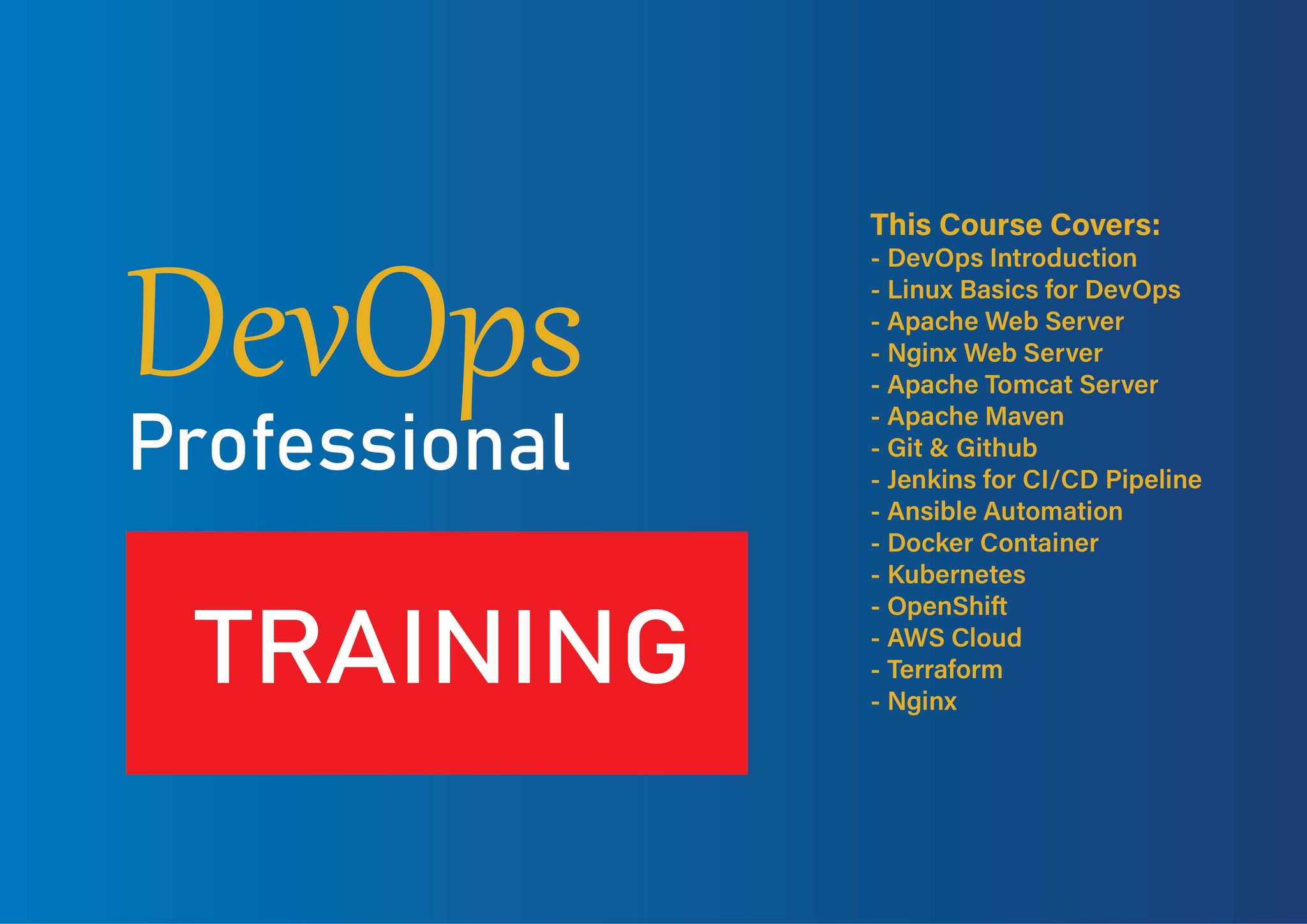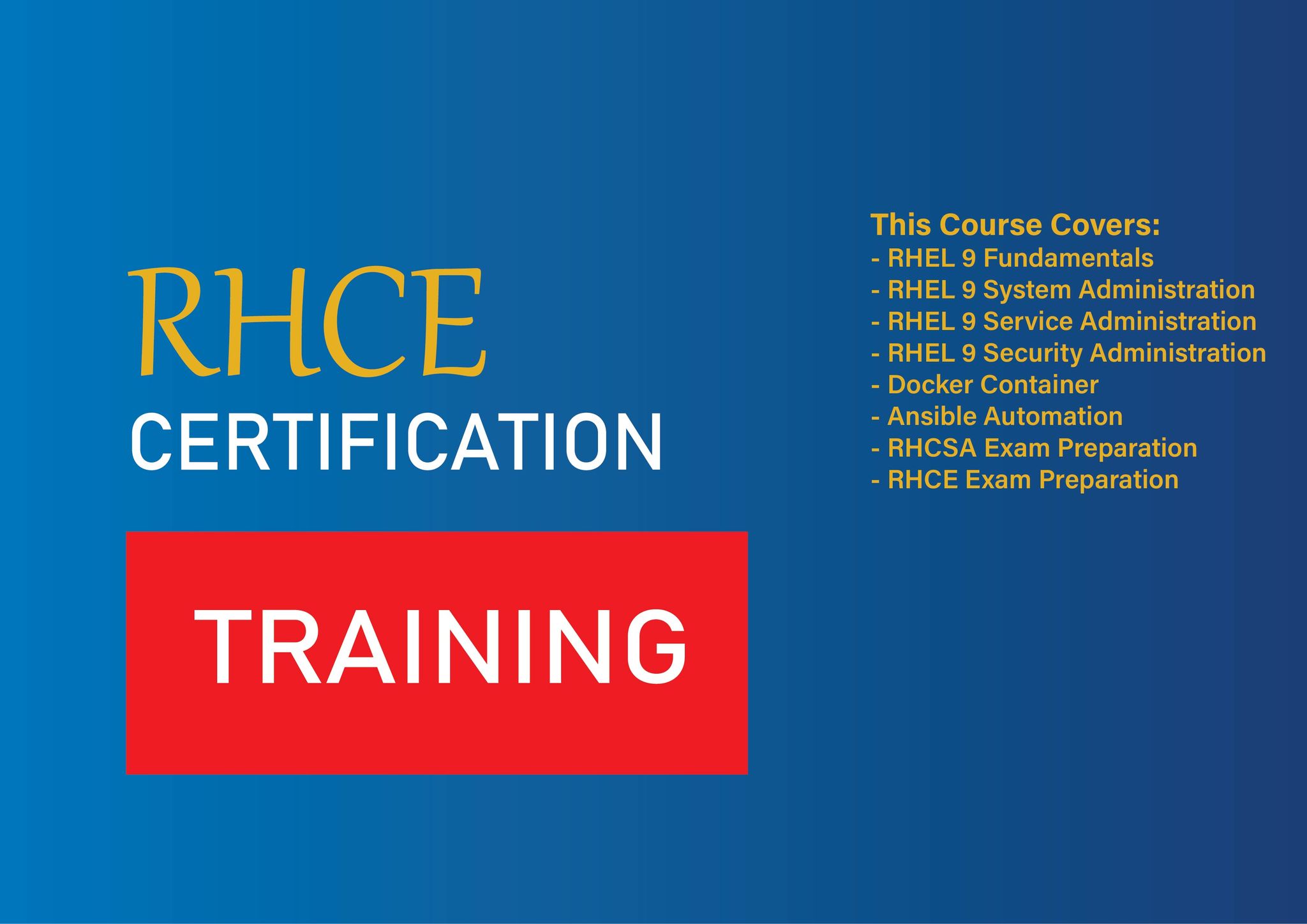DevOps Professional Training

| Date | Duration | Time | Discount | Actual Price | Our Price | |
|---|---|---|---|---|---|---|
| May 10 | 60 Hours | 07:00 AM | Call or email | Call or email | Call or email |
DevOps Professional course prepares students to become a professional DevOps Engineer. This course begins from scratch and gradually takes to a professional level. This is an extensive course to learn DevOps in depth. We assure that after taking this course, students will be able to work in Level 1 to Level 3 DevOps jobs. The course syllabus has been divided into two modules.
In first module, Deploying an Application Using CI/CD Pipeline, students learn DevOps introduction, creating virtual machines, using Vagrant, using Linux, configuring Apache HTTPD & Nginx web server, configuring Tomcat application server for hosting Java web applications, using Apache Maven to package an application, using Git version control system, using Jenkins for creating CI/CD pipeline & creating simple CI/CD pipeline.
In the second module, DevOps in Advanced Level, students learn using Ansible as automation tool for creating more efficient CI/CD pipeline, using Docker to run an application in container, using both Docker and Ansible together for deploying application in container in more efficient way, using Kubernetes for scaling and managing containerized applications, using OpenShift for deploying containerized applications, using AWS for creating and managing cloud instance, using Terraform for infrastructure coding and Nagios for system monitoring.
The assignments and tests are prepared in such a way that it prepares the students to work in production environment, succeed in the interviews and pass the certification exams.
Syllabus of “DevOps Engineer” Training
Trainer:
- Sanjiv R. Karn
- CKA, DevOps, Ansible, RHCI, RHCE, OpenStack, VCP, OCP
- 20+ Years of Training Experience
- Trained 400+ Corporate Batches
- Trained IT Professionals from Renowned Govt Org, Banks, Telecoms, Software Companies
- Provided Consultancy to Many Organizations
Course Objective:
- Equip participants with the skills and tools to implement DevOps practices effectively.
- Prepare participants with the latest tools and technologies required to become a professional DevOps Engineer.
- Prepare the participants to make them capable to grab a DevOps job in 2025
Targeted Audience:
- Software Developers
- System Administrators and IT Operations Teams
- Cloud Engineers
- Security Engineers
- Technical Leads and Engineering Managers
- Product Managers
- IT Managers and Directors
- Business Analysts
- Consultants and Freelancers
- Startups and Small Business IT Teams
- Anyone eager to become DevOps Engineer
Prerequisite Knowledge
- Familiarity with Computer
Total Training Duration
- 60 Hours
Module 1: Introduction to DevOps
- What is DevOps?
- Key principles of DevOps
- DevOps culture: Collaboration, communication, and shared ownership.
- DevOps Tools
- DevOps Career: Now and Future
Module 2: Preparing Lab (Virtualization & Vagrant)
- Virtualization Technologies
- VMware Workstation, Oracle Virtual Box & Vagrant
- Creating Virtual Machines in Automated way using Vagrant
Module 3: Linux for DevOps
- Installing Linux (CentOS, RHEL & Ubuntu)
- Basic Linux Commands
- Managing Users, Groups and Permission in Linux
- Managing Packages, Services, Logs, Schedules, Network and Firewall in Linux
- Configuring SSH in Linux
Module 4: Bash Shell Scripting & Python Programming
- Basics of Bash scripting
- Variables, Conditions, Loops in Bash scripting
- Automating day to day Admin Tasks using Bash Scripting
- Basics of Python Programming
- Variables, Datatypes, Conditions, Loops, Functions, Modules in Python
- Automating OS Tasks using Python
Module 5: Apache HTTPD, Nginx, Tomcat & Maven
- Configuring and Hosting Websites/App using Apache Web Server
- Configuring and Hosting Websites/App using Nginx Web Server
- Configuring Load Balancer using Nginx
- Configuring Tomcat to Host Java Web Application
- Using Maven to Build Java Web Applications
Module 6: Version Control Using Git & GitHub
- Introduction to Git & Github
- Basic Git Operations
- Working with Branches
- Collaborative Workflows
- Resolving Conflicts
- Tagging and Releases
Module 7: CI/CD using Jenkins, Nexus & Sonarqube
- Understanding CI and CD
- Setting up Jenkins Server
- Setting Up Nexus & Sonarqube
- Jenkins Jobs | Build, Test, Deploy & Notify
- Jenkins CI & CD Pipelines
- Pipeline as a Code
- Jenkins Administration
Module 8: Cloud Platforms (AWS, Azure & GCP)
- What is Cloud Computing?
- Architecture and Components of AWS Cloud
- Deploying Application in AWS Cloud Platform
- Architecture and Components of Azure Cloud
- Deploying Application in Azure Cloud Platform
- Architecture and Components of Google Cloud Platform
- Deploying Application in Google Cloud Platform
Module 9: Terraform
- Introduction to Terraform
- Plan, Apply, Update and Destroy
- Variables, Provisioners, Backend
- Writing Terraform scripts to provision infrastructure
Module 10: Ansible
- Introduction to Ansible
- Ansible Modules and Running Ad-hoc Command
- Writing Ansible Playbook
- Variables, Conditions, Loops, Handlers
- Ansible Roles
- Ansible for AWS, Azure & GCP
Module 11: Docker Container
- Introduction to Docker Container
- Creating Containers
- Container Volumes, Networks, Logs
- Creating Custom Image using Dockerfile
- Multi-stage Dockerfile
- Using Docker-compose to Deploy an Application
Module 12: Kubernetes
- Introduction to Kubernetes (K8s) and Its Architecture
- Setup Kubernetes Cluster
- Managing Pods
- Managing Services
- Managing Replica Controllers
- Managing Deployments
- Deploying Application on Kubernetes Cluster
Module 13: Monitoring and Logging
- Importance of monitoring in DevOps
- Tools: Prometheus, Grafana, ELK Stack
Module 14: Security in DevOps
- Integrating security into DevOps workflows
- DevOps security tools
Module-15: GitOps
- Introduction to GitOps
- Core Concepts
- Tools for GitOps
- Infrastructure as Code (IaC) for GitOps
- Kubernetes and GitOps
- GitOps Best Practices
Real Time Projects
- Project-1: Deploying Multi-tier Java-based Web Application
- Project-2: Deploying Microservice Application
- Project-3: Deploying Java, PHP, Python & Node.js Application Using CI/CD Pipeline
- Project-4: Creating CI/CD Pipeline Using Jenkins, Nexus & Sonarqube
- Project-5: Deploying Web Application on AWS Cloud
- Project-6: Deploying Web Application on Azure Cloud
- Project-7: Deploying Web Application on GCP
- Project-8: Deploying Application Using Ansible
- Project-9: Deploying Multi-tier Web Application in Containers
- Project-10: Deploying Microservice Application in Containers
- Project-11: Deploying an Application on Kubernetes Cluster
- Project-12: Using Terraform to Automate Infrastructure Automation
- Project-13: Implement a GitOps Workflow for a Multi-Environment Deployment.
- Project-14: Implement a Monitoring Solution for a Multi-tier Web Application using Prometheus, Grafana, and ELK Stack. Create custom dashboards and Alerts for Key Application Metrics.
Who should take this course?
Anyone who wants to build career as DevOps Engineer can attend this training.
What are the prerequisites for taking up this course?
As we start the course from scratch, anyone with basic knowledge of computer can join the course.
What is special about training from Professional IT Solution?
Our main strength is our long training experience and quality of our training. We have been producing skilled IT man power over a decade. Our trainer has more than 2 decade of training experience. Another major advantage is the quality of our training. We assure you that you’ll enjoy our training sessions.
How do you make participants ready for cracking interview and get jobs?
We engage our students with assignments that asks them to implement real time tasks which will make them confident to reply to the interviewers and handle their production servers when get selected.
Do you prepare students for taking up certification exams?
Yes, we take special exam preparations classes.
Do you also help your students in finding jobs?
Yes, of course! As large number of companies contact us for providing our skilled students for their job vacancies. So, we forward our students’ resume to the companies based on their skill match. But they have to crack interview to get selected. As during the training session we prepare our students with the possible questions/scenarios during interview, most of them crack interview successfully.
Do you Provide certificate after course completion?
Yes, we provide certificate of course completion. There should be at least 70% attendance in the class and should obtain at least 70% marks in the comprehensive test to obtain certificate of attendance.
What is success rate of your students in the Exam?
Almost 100% students (who appeared the exam) have passed their exam with excellent score.
What is the placement status of your students?
Almost 100% students have got placement.
What types of companies have you served?
Many renowned banks, telecoms, software companies and government organizations.
This course prepares for the Certified DevOps Engieeer Exam
Global IT Certifications
Kubeternetes
-
Certified Kubernetes Administrator (CKA)
Oracle Database
-
OCA [Oracle Certified Associate]
-
OCP [Oracle Certified Professional]
RHCI [Red Hat Certified Instructor]
Linux
-
RHCSA [Red Hat Certified System Administrator]
-
RHCE [Red Hat Certified Engineer]
OpenStack Cloud
-
RHCSA [Red Hat Certified OpenStack Administrator]
Ansible Automation
-
RHCS-Ansible [RedHat Certified Specialist in Ansible Automation]
VMware Datacenter
-
VCP [VMware Certified Professional]
Advanced IT Trainings
-
DevOps Professional (Git, Jenkins, Maven, Docker Container, Kubernetes, OpenShift, Ansible, Cloud, Nagios, Terraform)
-
Oracle RAC, Data Guard, Golden Gate & PT
-
Big Data, Data WareHouse, Data Science, NoSQL
-
Linux Server Hardening
Experience
-
20 Years of Training experience.
-
Trained 400+ batches (DevOps, Oracle Database, Linux, Ansible , OpenStack, VMware)
-
The Most Experienced Red Hat Trainer in Nepal
-
Trained large number of IT Professionals from many renowned national & international organizations (Govt. Organizations, Telecoms, Banks, IT Companies, Colleges, etc.)
-
Worked as consultant in many organizations
This is instructor led live virtual class.
Self-paced videos are available for self-learners.
Our assignments and tests prepares students for real-time work.
After completing this training, students can plan for Certified DevOps Engineer Exam
We have both the regular weekdays classes as well as long hour weekend classes.
We provide support to our students in the case of any technical issues.


